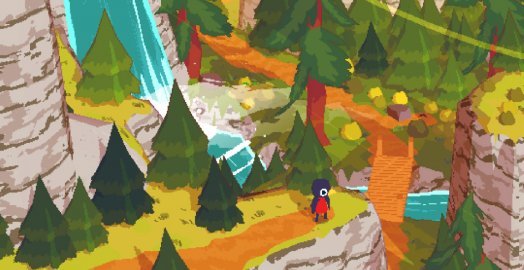A Short Hike is very much a slow game. You are free to explore the game’s world in any direction you want at any pace you see fit. There’s no real way for you to lose since the game prioritizes you having a relaxing experience instead of going through some crushing Dark Souls-level difficulty. There are very few, if any, complex or difficult game mechanics you have to learn other than learning how to use the golden feathers to do actions like glide and climb walls. The game doesn’t even really have a “main objective or mission” that it constantly reminds you that you have to accomplish at some point. Sure, the point of the game is to reach the highest peak of the mountain to receive cellphone reception, but there is never a point where the game pressures you to reach the peak as fast as possible. Qute the opposite in fact, as the game very much encourages you to explore as much of the map as possible and do as much as you can.
Whether it’s playing Beach-stick ball, quietly fishing (a minigame which I discovered you literally can’t lose at since when I first played the minigame, I was confused as to how to catch a fish, but there was never a moment where the game tells me I lost the fish as it kept biting at my bait), rock climbing, or racing against others, there are a limitless amount of activites that one can do in A Short Hike, and the game never tells you in what order you should do them or how many times you should do them. Hell, you techincally don’t even have to do any of these activities if you truly felt like it. If you want to just speedrun through the game and reach the top of the mountain, there’s nothing that’s stopping you since the game does not discourage any kind of play style.

However, despite the fact that there weren’t really any kind of restrictions and I could play however I wanted, I still had this strange feeling inside me while I was playing A Short Hike. Admitedly, this wasn’t really my kind of game, and so before I turned on A Short Hike, I was committed to just speedrunning through, getting to the top, beating the game, and then moving on with my life. However, suprisingly, none of that happened. Sure, I techincallly could have done exactly what I originally intended if I wanted to, but something about the game’s tone, atmosphere, and overall warmth that it gave off made me want to take my time. It made me want to explore every nook and cranny that this game could offer. It made me want to play every single minigame available. It even made me want to talk to every NPC (which is rare considering how often I avoid NPCs in Pokemon and RPGs like the plague!).
Utlimately, A Short Hike is a slow game, and in my opinion, that’s what makes it a very special kind of game: a game that doesn’t require any complex game mechanics or crushing difficulty modes, but just asks that you have a fun time. After the countless other games that I’ve played for this class, ranging from self-existential stories of dread, scary accounts of horror, and mind-numingly frustrating rogue-like games, A Short Hike stands out as something that I could actually sit back, relax, and enjoy my time playing. Sure, reaching the highest peak will allow you to “win” the game, but sometimes, it’s better to enjoy the experience instead of focus on winning.



Hello! I loved reading your article and completely agree, A Short Hike is a game that is about letting go. In my blog post, Im actually talking about the ways in which the game tries to make the player forget about even its own mechanics by making everything feel “ordinary.” When one actually tries to keep track/think of all the objects, NPCs, and currency in the game, it’s more complex then the game lets one know because it hides them.
I totally agree that slow games are largely about the spirit of play. Rather than the emphasis being on the speed at which the game is played, I see “slow” as referring more to the player’s freedom to play aimlessly, to explore and enjoy the experience of the video game in a more aesthetic way. Slow games, despite being about mostly ordinary things, remove us from the demands of the real world. Their ordinarity, on the other hand, teaches us to slow down and enjoy life’s pleasures once we’ve put the game down.
The way that you describe your approach to A Short Hike really resonates with me because that is exactly how I approached the game — I was going to get to the top of the mountain as fast as I could, but then I didn’t. I think that the feeling of urgency, or lack thereof, really makes the completion of the “objective” feel less enticing, and I have been thinking about how a game developer might make an objective seem more or, in this case, less urgent. Maybe it just comes down to the virtual stakes in the game — often life or death — but I think there is something about the music, the bright colors, the predictability, and the movement of your character that can make a game — and make A Short Hike — “comfortable” and thus easy to explore and sit with for a while.